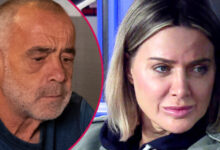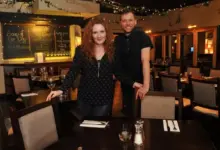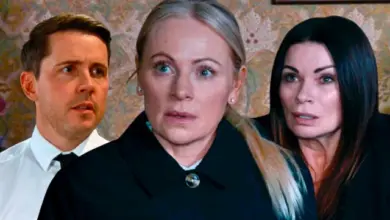How Coronation Street’s Gail Platt became soap royalty – and captivated a nation
Gail Platt is a name synonymous with British culture. From soapland to the pop culture world, there are few people who don’t know of the iconic Coronation Street character, portrayed strikingly by Helen Worth for the last fifty years.
The irony behind it is that she hasn’t been credited as such for fourteen years. In fact, she’s been married three times since her divorce from Martin (Sean Wilson) in 2001. But Gail Platt is a name firmly etched in the famed cobbles that line the soap’s set in Trafford, Greater Manchester.
Helen Worth has made global headlines this week, and I can’t think of any other soap opera actors that have had the same appeal.
Her departure at the end of this year will leave a devastating gap and firmly close yet another door on the Corrie of old.
A firm fixture on the street, Gail has offered a sense of familiarity to the audience, and reliability to viewers who have tuned in each night to see the next obstacle she has to overcome – usually involving her children.


Fans have grown up with the character. Perhaps some might argue that the comedic charm we’ve become accustomed to over the last 10 years is a far cry from the more woeful Gail we saw during her married life.
The sight of her slamming the Jim’s Cafe door shut at the end of a working day, turning the sign to ‘closed’ and dramatically falling to the floor in tears as the soap’s signature tune faded in was one that closed many an episode throughout the 80s and 90s.
Introduced in 1974, Gail Potter soon established herself as the flirtatious teenager who worked behind the counter in the corner shop, putting her in a prime position to interact with iconic original characters such as Ena Sharples (Violet Carson) and Elsie Tanner (Pat Phoenix).
It was with Elsie that she later found lodgings, and perhaps it was the influence of the legendary red-head that would cement Gail as a crucial part of the street’s structure. Elsie took somewhat of a maternal role over the youngster, in the absence of her own flighty mother Audrey (Sue Nicholls), who we first met when Gail became engaged to Brian Tilsley (Christopher Quentin).
Brian’s mum was god-fearing Ivy (Lynne Perrie), a real force of nature that wouldn’t leave the young family short of drama for the next fifteen years – even beyond the death of her son when he was stabbed outside of a nightclub in 1989. This was the first instance of seeing true heartbreak in Gail’s life, and Ivy’s resentment made it harder for her to broach the subject with the Tilsley’s nine year old boy Nicky.

The women continued to clash well into Gail’s second marriage, this time to Martin who was significantly younger than her. Constantly warring, looking-back, their relationship evoked memories of creator Tony Warren’s original vision of strong, Northern women and their everyday working-class lives in the backstreets of Manchester.
I’m sure there are many women who could resonate with having a domineering mother-in-law attempting to manipulate their every decision.
In this era, Gail was relatable to the atypical viewer in that she was your average working mum; somewhat downtrodden, characterised by her apron and tied-back hair, and constantly snowed under in the greasy spoon with best friend Alma (Amanda Barrie) in a bid to give her kids a better life.


One would hope that the soap’s producers are writing a happy ending for Gail, not least because of the years of turmoil that would soon follow.
Following Ivy’s death, Gail was able to breathe a sigh of relief and flourished as the matriarch of the Platt clan, but things weren’t to go too swimmingly – Martin would prove unfaithful, several times, and newly recast 13 year old daughter Sarah (Tina O’Brien) discovered she was pregnant.
It’s every parents worst nightmare – how would she cope under the financial strain of yet another child to provide for? The storyline also proved to be one of Coronation Street’s most controversial, and Granada Television were forced to defend a plot that the press assumed was glamourising teenage pregnancy.

At the time, a statement released by the show’s publicity office said: ‘It is a fact that Britain has Europe’s highest teenage pregnancy figures and Coronation Street is reflecting that and telling the story of one young girl.’
This would be one of the first stories that wielded the serial into the new millennium, with an ‘issue-led’ story focus that is now commonplace in continuing dramas. The government eventually praised actors Worth and O’Brien for their raw performance and for raising awareness of what was, at the time, a very taboo topic.
An audience of more than 19 million tuned in three years later to see the downfall of Gail’s third husband Richard Hillman (Brian Capron).


‘You’re twisted. You’re Norman Bates with a briefcase. And I don’t want you living under the same roof as my family’ she told him in the two-hander episode, after discovering he’d murdered his ex-wife Patricia and their neighbours Duggie and Maxine.
The sheer amount of people watching is testament to how much the public love our Gail, after all she’d been in their living rooms up to four nights a week for best part of thirty years. The following month, the nation cheered when Hillman drowned after driving his family (who were rescued) into the canal to the tune of 90s ‘Wannadies hit ‘You and Me Song’, which will forever be synonymous with the scene, having played on the car radio as they made their almighty plunge into the cold water.

Fourth husband Joe McIntyre (Reece Dinsdale) met a similar end when he died in Lake Windermere, trying to fake his own death to avoid his mounting debts. Gail was wrongly sent to prison for his demise, and I felt like it was a poor attempt to recapture the 1998 outcry when Deirdre Rachid (Anne Kirkbride) was similarly sent down.
Unfortunately, everyone knew that she would eventually be freed. By this point, the show was littered with criminals – it was implausible that such a much-loved resident would be sent down for the rest of her days whilst killer Tony Gordon (Gray O’Brien) continued to evade justice.


Comparisons could be drawn to a recent story that saw innocent Roy Cropper (David Neilson) imprisoned for the apparent murder of Lauren Bolton (Cait Fitton).
The character mellowed following her time spent at Her Majesty’s Pleasure, and Helen Worth has been given little in the way of a gritty story to really get her teeth into, which is a great shame as she is a fine actress, capable of far more than a one-liner thrown in to conjure up a laugh or two.
For me, the first signs of her personality transplant appeared when she fell head over heels for burglar Michael Rodwell (Les Dennis). There was once a time when Gail, fiercely defensive of her family, would’ve driven an intruder in her own home out of Weatherfield, never to return.

However, one of the most-memorable, defining moments of her five decades came in 2018. It was a sign that the true Gail was still there, underneath a façade, as she reflected on the death of Aidan Connor (Shayne Ward), who had taken his own life.
The spell-binding monologue was interlaced with scenes of Aidan’s family and friends learning the news, whilst back at No. 8, Gail and Audrey wondered if David (Jack P. Shepherd) would return home after failing to make his planned appearance in court for his prior attack on Gary Windass (Mikey North).

More recently, she and archenemy Eileen Grimshaw (Sue Cleaver) put their differences to one side for a brief moment, stood over the memorial bench in Victoria Gardens for superfan Martyn Hett and the other 21 victims who were killed in the terror attack at Manchester Arena in 2017.
It’s moments like this that make Coronation Street real, raw, and in touch with the audience – and the show owes a lot to Helen Worth for its success.
I’m sure whatever bosses have up their sleeves for Gail’s finale will be spectacular. I’m also sure that I wouldn’t like to be in the position to be deciding that myself – how do you begin to contemplate an appropriate way to wrap up such a lengthy stint?






